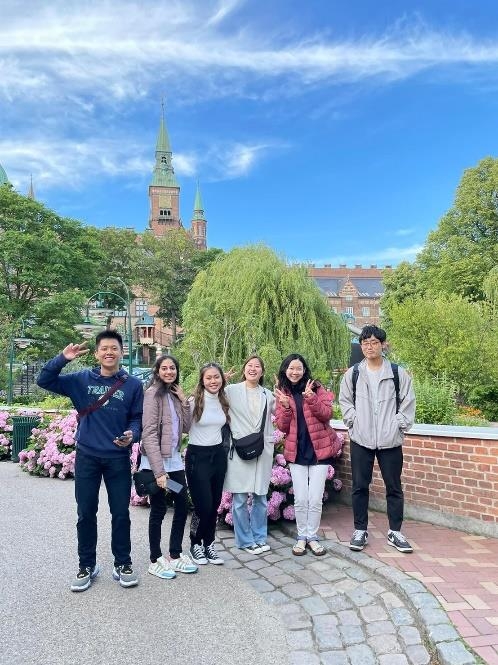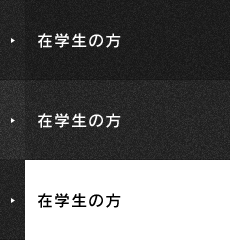協定校シーズンプログラム (デンマーク工科大学) 2023年6月1日~6月22日
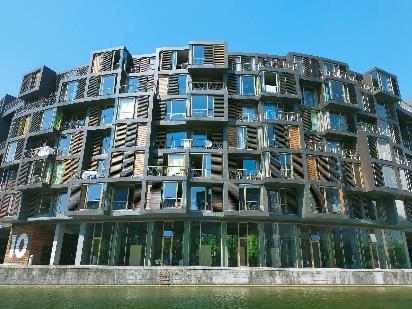
留学時の学年: |
M2 |
|---|---|
所属: |
環境・社会理工学院 建築学系 |
留学先国: |
デンマーク |
留学先大学: |
デンマーク工科大学 |
留学期間: |
2023年6月1日~6月22日 |
プログラム名: |
Program overview
In June, I attended a summer school at the Technical University of Denmark for three weeks. I took an English class for master's students in the field of electronic engineering, titled " Design and Implementation of Coordinated Distributed Energy Systems .." The goal of this class is to create and implement a system that integrates nat ural energy sources such as wind and solar power generation with storage batteries, hydrogen factories, and power plants to manage them in an integrated manner. A team of 3 4 people will jointly write the program and implement it at the university facility , SYSLAB . In the first two weeks, you will learn the knowledge necessary for design, and in the last week, you will actually implement and test the program at SYSLAB.
Schedule
Of the 15 days of classes, 6 days have classes at a distant campus. On the far campus, we use a facility called SYSLAB to test the system we created. Because the campus is far, I get a ride in a classmate's car, or take a train for about 2 hours to go home Classes are from 9:00 to 16:00. After class, I went out to play or reviewed what I learned in class.
Purpose of participating in the program
1. By looking at the lives of Danish people who have a high work life balance I can use it as a reference to improve the stressful lives of Japanese people who work long hours of overtime.
2. Be confident in speaking in English.
3. By getting to know different countries, you can recognize the unique qualities of Japan.
Denmark is known as one of the happiest countries in the world. In addition, despite the short working hours, the average annual income is high. I wanted to find out how t hey spend their leisure time a nd why they are so productive.
Activities
Classes with discussion
The class style was active and fun. There was a lot of time for discussion, and there were many opportunities for students to express their opinions. On the first day of class, I was asked "How do you think?" but could not answer. Up until then I just listened to classes without thinking by myself. At the class, f or example, a teacher describe d two systems and students discuss ed which method is superior. I think that students who have been doing this training on a daily basis are strong when the y go out into society and are forced to make choices with no right answer. After that, I started to think "What do I feel?"
Max and Amay
I and Max and Amay sat next to each other at the first class due to Danish students have already formed a community . Max is from Germany and came to DTU for a six month credit exchange. A may is from France to get a master's degree at DTU. We became a team and ate lunch together every day for three weeks. I was able to talk a lot during lunch and breaks.
Among talking with them, I was impressed by their super positiveness, an active attitude toward learning, and the mind without worrying about what others thought of him.
Max's favorite phrases are "Good”,"Nice” and "Super good.”He complimented me no matter what I say. I feel so much better when I talk with him. Every event has a positive side and a negative side. Both Max and Amay focus on the positive side. I want to became like them.
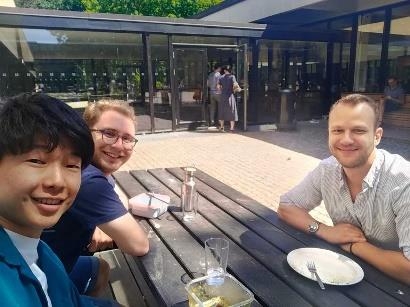
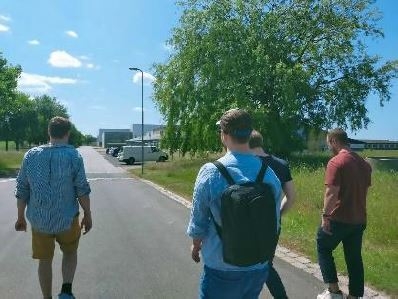
appetite for learning
They didn't ask my age when we introduced ourselves. They asked what they had been
doing. Amay and Max talked about what they had learned so far and what they would like to learn next, I was surprised at that time. I never thought about what I wanted to learn next . I just took classes that everyone else taking. European students are also required to take at least 100 credits for the master's program. It
means they spend a lot of time in class and does research only for half a year. In Japan, on the other hand, there are few master's classes, and if you include the fourth year of the undergraduate course, you can do research for three years. I think this is one of Japan's strengths, as it allows students to think deeply about their research and experience the lives as a researcher. However, the reason why I thought European students were studying actively is the difference in the number of required credits in the master's course. Amay also said that there were many compulsory subjects in the bachelor's course, and there were not many course options.
Live life as you like.
DTU students wear very casually. It is a form that pursues its own comfort with a style of shorts and a T shirt. In Japan, on the other hand, there is pressure to be well groomed and fashionable. I think it's good to have an society where you can go out in comfortable clothes without worrying about what other people think like in a work place.
We sometimes ate lunch in the cafeteria, but we often brought lunch box. Max had bread for lunch, there is a custom of having a hot meal just once a day in his country Germany. On the other hand, Amay had elaborate lunch, who is from France, has a strong interest in food The fact that people can act as they please without worrying about how they are evaluated by others is probably a form of European culture that respects individuals and does not interfere.
The custom of respecting individuals was also seen in class discussions. When I said a completely irrelevant opinion, they kindly accepted that there is such a way of thinking, and then tried to incorporate it into the team's opinion I thought it was too much to respect even the fact that I was wrong . Since then, I have been aware that I am responsible for my speaks, and I have come to speak cautiously.
Relaxing time
In Denmark there is a word "Hygge." It means to relax with coffee or alcohol in one hand, alone or with loved ones such as friends and family. The time spent in simple rooms and cafes where you can feel the warmth of nature, or outdoors surrounded by nature was wonderful. I was able to feel the richness that cannot be experienced in Japan. I was able to be dazed, enjoy a good cup of coffee, lose myself in thought, and feel very relaxed.
Japan is materially rich. Products are sold according to each purpose, and they are easy to buy. However, because of that, the number of things increases in their house. I don't think people feel comfortable with too many stuffs. The beauty of the scenery is also important for Hygge, such as a room with few objects and the rich nature that can be seen from the window. I think one of the reasons why Hygge can't be practiced in Japan not only for the people's mindset, but also environmental factors.
Self catering
I usually cooked for myself when I was in Denmark. There are many ingredients I have never seen in supermarkets, such as white asparagus and golden blueberries. I and Mr. Kajikawa, who went to study abroad to DTU on the same program, went to each other's houses and made dinner together. Also, thus I didn't have a rice cooker, so I used a pot to cook rice. It cooked miraculously well. It was an experience that I could not do in Japan. After I got home, I tried to ma ke the potato stewed in tomato that was delicious in the school cafeteria, and the coconut curry that A may had for lunch. It was a really fun self cooking life, trying dishes I had never made before and tasting new ingredients.
Accommodations
I used Airbnb and stayed at two accommodations. The host of the first accommodation is Mr. Svend. I could use the kitchen at all times that I was able to cook many dishes and invite Mr. Kajikawa to cook together. The host of the first accommodation is Mrs. Anne. It was a historic thatched roof house built in 1816. There was a very large garden with many beautiful flowers, I was able to stay in the attic, and there was a cute dog. The hosts two were also very friendly and gave me tips on how to live a rich life. Mr. Svend works just to earn money to live, and he worried about the workaholic work style in Japan. He also listen to jazz when he do his worked.


People in Copenhagen
Walking around Copenhagen, I often see people drinking alcohol from noon on weekdays.
According to Mr. Svend, it's no problem to drink during lunch even when they are working. I often saw a couple enjoying alcohol. Is it because of the rich environment?
Many place s to relax
There are plenty of places to relax in Copenhagen. There are many places in the city where you can relax, surrounded by nature, such as on both banks of rivers, around ponds, and on cafe terraces. It's the perfect city for Danes who love hygge. To make such a beautiful city, the population density must be a big factor. Copenhagen has a population density of 6,015/ km2, about one third the density of Tokyo. With a lot of traffic, you can't relax, and the more residential land you have, the less space you have for gardens and greenery. I became interested in population density and the origin of cities.
Denmark is a bicycle society with flat terrain. With the strict rules like hand signs and use of bicycle lane, the speed of the bicycle is very fast. When I borrowed a bicycle from the host and went cycling, I followed the local people, but I was pedaled with out of breath, and by the time I got off the bicycle, my legs were full.
Learning in a different field
I had a hard time because my major was different, but I learned a lot of new things. PID control mechanism, the use of Git for joint syst em development, Droop control a mechanism for stabilizing transmitted power, and communication methods for remote control of equipment and so on.
In my research, I use Python for analysis, and I learned a lot in the process of writing system programs. It is to write separate scripts for each function, such as function definition script, parameter script, scripts of each controller, and script execute all scripts collectively. This method has the advantage of making the script easier for others to understand. Also It turns out that you can run a specific script with arguments. It can be used in future research. It seems to be useful for smooth communication when developing systems with programmers in the future, such as clarifying what variables are.

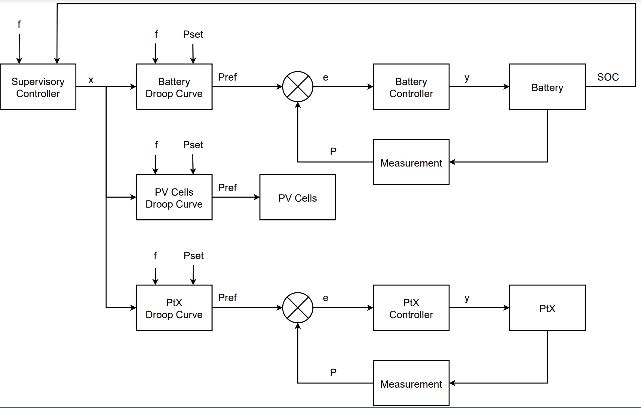
Architecture
There is a famous design office called BIG led by Bjarke in Denmark. He has worked on many buildings with an eye on the near future city, and it is exciting to see his architecture. Denmark has a lot of beautiful architecture. Because it is a country with few earthquakes and heavy rains, it allows them to build as they image.
“The Tietgen Residence Hall,”a circular dormitory, was the highlight. When I was observing the randomness and laws of unevenness, I stayed for nearly an hour and a half. A house with a terrace, a house that protrudes on two levels, and the level difference between the rooms on the top, bottom, left, and right seem to be random, and I was impressed by the rational design. How long did this designer spend to design?
The Malmö Municipal Library was also wonderful when I visited Sweden. Despite being in Sweden, where it is very cold in the winter, we created a large space that is entirely covered with glass. I went there in June, so the temperature was best, and the view of n ature was beautiful, and the space was breathtakingly beautiful. According to the library staff, this season is very beautiful, but it is cold enough to wear down layers in the winter and boiling hot in summer. I was surprised by the decisiveness of cr eating a building that is specialized only for a specific season.
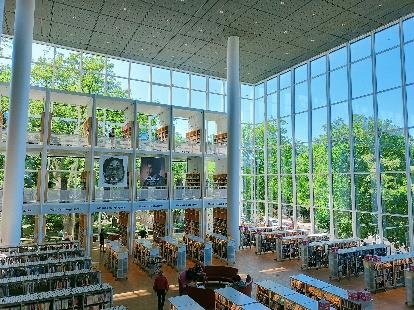
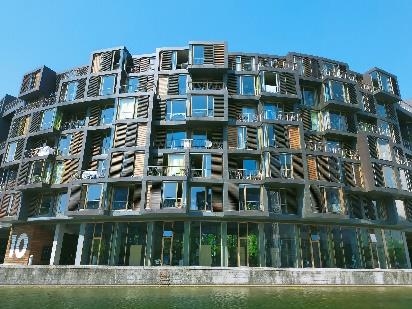
Struggling in another field
I wanted to choose the class to learn about building with IoT, which control facility atomically and save energy by integrating the management of home appliances. When I asked my teammate Amay about the field of the class, he told me it was electronics engineering. In the class, there were many things I didn't know, such as feedback control using PID control, Git, Droop control, and the communicate mechanism of devices. Thus, other classmates had already learned it, there was only briefly explain in class. I looked terms up on the internet one by one, but I couldn't catch up with the class. There were many things I didn't understand even in the assignments, and my teammates Amay and Max taught me many times. I was touched by the bottomless kindness of the two. They sometimes wrote notes in their notebooks to teach me. However, there were so many things I could n 't understand, and I thought that asking them to teach me everything would get in the way of their work, so it became difficult to ask them. Gradually, I lost track of what they were
doing, and I couldn't give my opinion in the team discussion. I couldn't contribute to the team, and I realized my powerlessness over and over again.
I don't want to experience that helplessness again; I realized the importance of hav ing own expertise. I wanted to become a person who can be relied on even if there is a lan guage barrier.
When I thought about my specialty, I studied architecture when I was an undergraduate and majored in brain science in the Department of Building Engineering in graduate school, but I don't have enough knowledge to call it as my measure. I re gretted that I studied half heartedly in every field. I thought that architecture should have been fully immersed in architecture. For the six months until graduation, I want to read papers and books about electroencephalography and become a specialist. After joining the company, I would like to independently study the field that interests me and become an expert in that field.
English level
During the discussion on the first day of class, I was disappointed because I could not understand the English of the local students. In particular, Amay from France seemed to be speaking with a handkerchief in his mouth, so I could hardly understand him. Even if I was familiar with the English pronunciation of Max from Germany, but even so, I could only understand 30% of the conversation.
As the days went by, I became accustomed to French English and was able to understand the general flow of conversation. However, I realized my lack of English ability. I have had opportunities to use English before, such as when traveling abroad, and I was able to convey my thoughts there. However, when it comes to daily conversation, it is necessary to speak without breaking the rhythm, so I found that just speaking is not enough. I didn't know the phrases used in daily conversation, lacked vocabulary, and couldn't come up with words smoothly.
I learned that there are four levels of English. The first tier is Travel English, the second tier is Daily English, and the third tier is Classroom English and Business English. I am good at travel English, so next time I want to study everyday English. In the six months until graduation, I want to memorize phrase sets for each scene of everyday conversation until they come out of my mouth. Also, increase the vocabulary you use in y our daily life. And I'd like to meet Max and Amay in 5 years and be able to have a fluent conversation.


